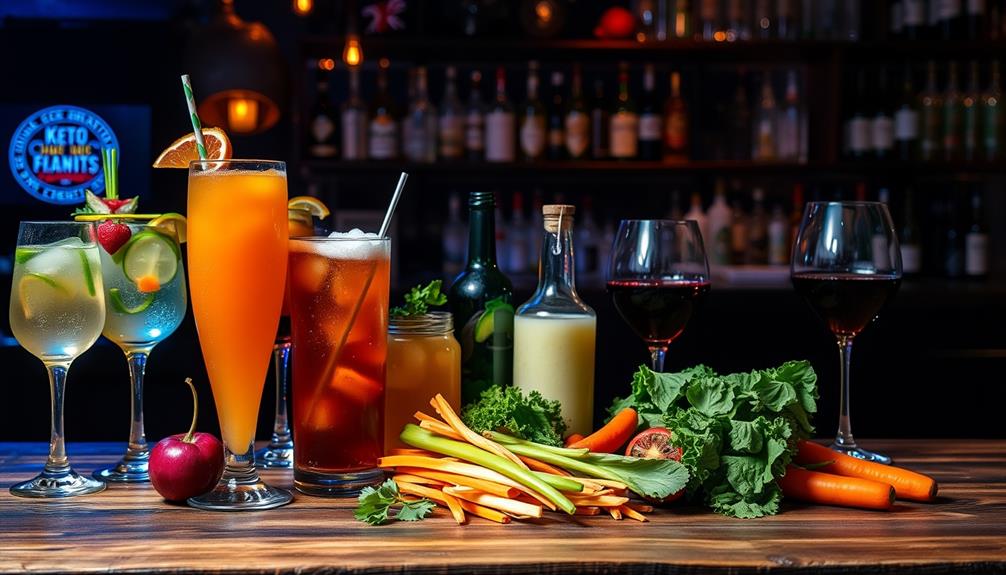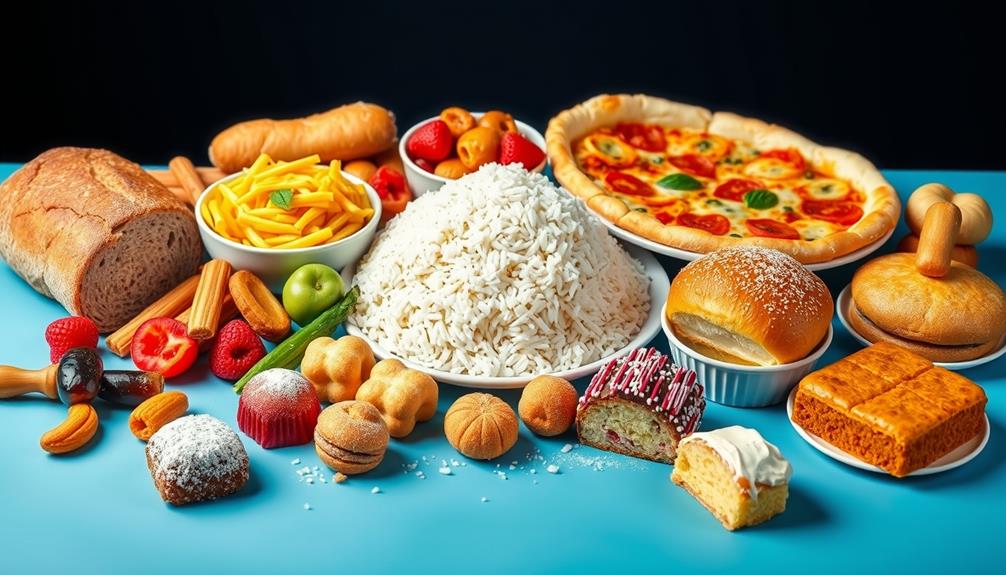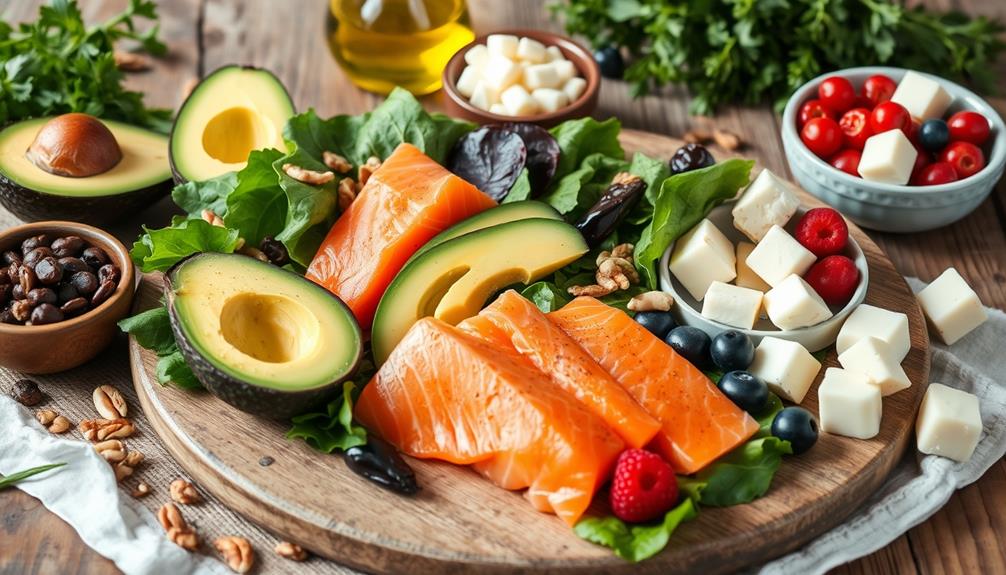On a keto diet, you can't eat high-carb foods. Avoid refined carbohydrates like bread, pasta, and rice, which can spike your blood sugar. Steer clear of sugary snacks, sweetened beverages, and high-carb fruits like bananas or grapes. Starchy vegetables such as potatoes and corn are also off-limits. Processed and low-fat foods often hide sugars, so check labels closely. Don't forget about sweetened dairy products and granola bars, which may contain more carbs than you realize. By sticking to these guidelines, you'll help maintain your ketosis. There's much more to explore about what fits into your keto lifestyle.
Key Takeaways
- Avoid refined carbohydrates like white bread and pasta, which significantly increase carb intake.
- Steer clear of high-sugar fruits such as bananas and grapes that contain excessive natural sugars.
- Eliminate starchy vegetables like potatoes and corn that can disrupt ketosis with high carb counts.
- Refrain from consuming processed and low-fat foods, as they often contain hidden sugars and unhealthy fats.
- Avoid sweetened dairy products such as flavored yogurts and ice cream, which can be high in carbs.
Refined Carbohydrates

When it comes to the keto diet, avoiding refined carbohydrates is essential. These carbs can sabotage your efforts to maintain ketosis, leading to unwanted weight gain and fluctuating blood sugar levels. For instance, just one slice of white bread packs about 13 grams of carbs. If you opt for cooked white pasta, a single cup delivers around 33 grams of carbs, which is a significant hurdle on your path to ketosis.
Additionally, refined carbohydrates can contribute to gastrointestinal discomfort, making it even more important to steer clear of them, especially if you're considering a juice cleanse for detoxification juice diets and health issues. And don't be fooled by white rice; a half-cup of cooked rice contains approximately 26.5 grams of carbs, complicating your carb management.
Instead, focus on low-carb options that align with your ketogenic lifestyle. Mashed cauliflower can serve as a fantastic substitute for traditional carbs, and bread made from eggs and nuts can satisfy your cravings without kicking you out of ketosis.
Sugars and Sweeteners

Steering through the world of sugars and sweeteners can be tricky on a keto diet, as many of these options are loaded with carbohydrates that can quickly derail your progress.
Sugars like honey and maple syrup are particularly problematic; honey contains about 17g of carbs per tablespoon, while maple syrup has around 13g. These high-carb sweeteners can exceed your daily limits and interfere with ketosis.
Additionally, it's crucial to be mindful of hidden sugars in processed foods, which can be just as detrimental to your keto journey. For instance, certain condiments and sauces may contain unexpected sugars, so always check the labels for carbohydrate content or consider making your own using natural alternatives whenever possible.
You should also avoid sugary condiments such as ketchup and barbecue sauce, which can spike your blood sugar levels with just a few packets.
Similarly, fruit juices may seem healthy, but they're high in natural sugars and low in fiber, leading to unwanted blood sugar spikes.
Instead of reaching for these high-carb options, opt for low-carb alternatives like stevia or erythritol.
These sweeteners can satisfy your cravings without jeopardizing your keto diet. By steering clear of high-carb sugars and sweeteners, you'll stay on track and maintain the benefits of ketosis.
Alcoholic Beverages

When you're on a keto diet, choosing the right alcoholic beverages can be tricky. Many drinks, like beer and sugary cocktails, pack in high carbs that can derail your progress.
To maintain a balanced diet while on keto, it's important to be mindful of your overall carbohydrate intake, as it plays a vital role in achieving your health goals effective strategies for weight loss.
To stay in ketosis, you'll need to focus on low-carb alternatives and practice moderation with your choices.
High-Carb Alcohol Options
Maneuvering the world of alcoholic beverages can be tricky for those committed to a keto diet, as many popular options are high in carbohydrates. Understanding which drinks to avoid can help you stay on track with your dietary goals.
Here's a quick reference table to illustrate some high-carb alcohol options:
| Beverage Type | Carbohydrates (per serving) |
|---|---|
| Beer | Up to 13 grams (12 oz) |
| Light Beer | Approximately 6 grams (12 oz) |
| Cocktails (with mixers) | 20 grams or more |
| Dessert Wines | 10-20 grams |
Regular beers can derail your keto efforts, while cocktails often come loaded with sugary mixers and sweetened syrups, pushing carb counts even higher. Dessert wines should also be avoided, as they can pack around 10-20 grams of carbs per glass. Although light beers seem like a safer choice, they still contain about 6 grams of carbohydrates. To maintain ketosis, you'll need to carefully manage your alcohol intake and be selective about your choices.
Low-Carb Drink Alternatives
If you're on a keto diet and still want to enjoy a drink, there are plenty of low-carb alternatives that can fit into your lifestyle. Traditional alcoholic beverages often contain high amounts of carbs, but you can make smarter choices to maintain your ketosis while enjoying a drink.
Additionally, just like how diversifying your retirement portfolio with options like a Gold IRA can be beneficial, selecting the right drinks can help you stay on track with your health goals.
Consider these options:
- Dry wines: Red or white varieties typically contain only 3-5 grams of net carbs per glass.
- Spirits: Vodka, gin, and whiskey generally have zero carbs, making them great choices.
- Low-carb mixers: Use soda water or diet tonic instead of sugary mixers to keep your drink keto-friendly.
- Lemon or lime juice: A splash adds flavor without greatly increasing net carbs.
When enjoying alcohol, remember to monitor your consumption. High-carb foods and sugary mixers can interfere with your weight loss goals.
Moderation and Ketosis Impact
Enjoying low-carb drink options can still pose challenges on a keto diet. Many alcoholic beverages can disrupt your ketosis, especially those high in carbs. For instance, light beers can pack around 6 grams of carbs in just one 12 oz can. Mixed drinks often contain sugary mixers, which can quickly sabotage your weight loss efforts. Even sweet wines can be tricky, as dessert wines are particularly high in sugar, making them unsuitable for your low-carb lifestyle.
To help you navigate your options, here's a quick reference:
| Alcoholic Beverage | Net Carbs (per serving) |
|---|---|
| Light Beer | 6g |
| Sweet Wine | 10-20g |
| Mixed Drinks | 15-30g (varies) |
| Spirits (e.g., Vodka) | 0g |
| Dry Wine | 3-5g |
While spirits like vodka and whiskey are low in carbs, moderation is essential. Overindulging can still disrupt ketosis. Always account for the carbs from your drinks within your daily limit of 20-50 grams of net carbs to successfully maintain ketosis and support your weight loss efforts.
High-Carb Fruits

When following a keto diet, it's crucial to be aware of high-carb fruits that can quickly derail your progress. These fruits can greatly impact your daily net carbs, making it harder to maintain ketosis.
Understanding financial terms can help you plan your budget for healthy eating. Here are some high-carb fruits you'll want to limit:
- Bananas: About 24 grams of net carbs per medium fruit.
- Grapes: Roughly 18 grams of net carbs per cup.
- Mangoes: Contain around 22 grams of net carbs each.
- Pears: Approximately 21 grams of net carbs per fruit.
Additionally, dried fruits like raisins and dates are extremely high in sugar; a single Medjool date packs around 18 grams of carbs.
You'll also want to keep apples in check, averaging 21 grams of net carbs per medium apple.
Instead of indulging in these high-carb fruits, focus on lower-carb fruits like berries, which typically contain fewer than 10 grams of net carbs per serving.
This way, you can enjoy fruit while staying on track with your keto diet!
Starchy Vegetables

When you're on a keto diet, it's essential to watch out for starchy vegetables like potatoes, corn, and sweet potatoes, as they can quickly push you over your carb limit.
These vegetables are high in carbohydrates, which can make it challenging to maintain ketosis and achieve your weight loss goals.
Instead, consider swapping them for low-carb options like leafy greens or cauliflower to stay in ketosis.
Understanding portion sizes is equally important, so make sure you're mindful of how much you're consuming.
For additional guidance on dietary choices, refer to nutritional advice.
High-Carb Vegetable Examples
In the domain of the keto diet, it's crucial to be aware of high-carb vegetables that can sabotage your efforts. These starchy vegetables can easily push you over your carb limits, disrupting ketosis.
It's important to recognize that developmentally, children may have preferences for certain foods, which can be shaped by early dietary choices and environmental interactions environmental interactions shape individual development.
Here are a few examples you should definitely avoid:
- Corn: With around 19 grams of net carbs per cup, it's often sneaky in dishes.
- Sweet Potatoes: A medium-sized sweet potato packs about 20 grams of net carbs, making it a high-carb choice.
- Peas: Containing about 12 grams of net carbs per cup, they can add up quickly in your meals.
- Beets: Although nutritious, beets have roughly 13 grams of net carbs per cup, so consume them in moderation.
To stay on track with your keto diet, it's best to limit these high-carb vegetables. Instead of opting for starchy varieties, focus on low-carb options that can still give you the nutrients you need without derailing your progress.
Keeping an eye on your carb intake will help you maintain ketosis and achieve your health goals.
Healthier Vegetable Alternatives
Finding healthy vegetable alternatives can make a significant difference in your keto journey. Starchy vegetables like potatoes and corn are high in carbohydrates, often exceeding your daily limit for maintaining ketosis. Instead, consider low-carb alternatives that help you stay on track while providing essential nutrients.
Here's a quick comparison of some starchy vegetables and their healthier substitutes:
| Vegetable | Net Carbs (per serving) |
|---|---|
| Medium Potato | 30 grams |
| Sweet Potato | 20 grams |
| Peas (1 cup) | 12 grams |
| Cauliflower (1 cup) | 3.2 grams |
Opt for cauliflower as a versatile substitute for mashed potatoes or rice due to its low-carb count. Leafy greens like spinach and kale are also excellent choices, offering around 0.4 grams and 1 gram of net carbs per cup, respectively. These veggies not only help keep your carb count low but also provide healthy fats and protein when combined with other keto-friendly foods. Remember, moderation is key, so make sure you balance your meals with these healthier vegetable alternatives to thrive on your keto diet!
Portion Size Considerations
Understanding portion size is vital when it comes to starchy vegetables on a keto diet. These foods can quickly elevate your carbohydrate intake, potentially knocking you out of ketosis.
It's important to be mindful of the net carbs in starchy vegetables and to limit your portions or avoid them altogether, especially if you're managing emotional dysregulation similar to how individuals with Borderline Personality Disorder (BPD) need to monitor their emotional triggers.
Consider these starchy foods and their carb content:
- A medium potato: over 20 grams of net carbs
- One medium ear of corn: about 27 grams of carbs
- A medium sweet potato: approximately 20 grams of net carbs
- One cup of butternut squash: around 15.3 grams of net carbs
These numbers clearly highlight the importance of moderation. While starchy vegetables may seem like healthy options, they can greatly impact your carb limits on a keto diet.
Instead, focus on non-starchy vegetables like leafy greens, broccoli, and cauliflower. These alternatives not only keep your carb intake low but also provide essential nutrients without derailing your ketosis goals.
Processed and Low-Fat Foods

What hidden dangers might lurk in processed and low-fat foods on a keto diet? Many processed foods, like chips and crackers, are packed with hidden sugars and unhealthy fats that can skyrocket your carbohydrate intake, ultimately disrupting your ketosis.
Additionally, some air purifiers can help improve the overall environment where you prepare meals by reducing airborne contaminants that may affect your health, making it vital to guarantee proper airflow around the unit.
Low-fat products often compensate for their reduced fat content by adding sugars, making them higher in carbs than full-fat options. This can seriously hinder your weight loss efforts on a keto diet.
Snack items such as granola bars can pack over 20 grams of carbs per serving, rendering them unsuitable for your low-carb lifestyle. Pre-packaged meals may be marketed as healthy, but they frequently contain hidden carbohydrates and additives that can derail your commitment to keto.
It's essential to read labels carefully. Many processed and low-fat foods may also contain trans fats, which not only pose health risks but can also contribute to weight gain.
Sweetened Dairy Products

When it comes to sweetened dairy products, you need to be cautious, as they can easily sabotage your keto diet. Many of these items are packed with added sugars and high carbohydrates, making them unsuitable for maintaining ketosis.
For instance, if you're considering investment options for your retirement, Gold IRAs can provide a solid foundation, much like how choosing the right dairy products can support your health goals.
Here are some common culprits to avoid:
- Flavored yogurts, which can contain up to 20 grams of carbs per serving
- Ice cream, where some varieties exceed 30 grams of carbs
- Low-fat yogurt, often loaded with added sugars to compensate for reduced fat
- Whole milk, which has around 11 grams of carbs per cup
Instead, you should opt for plain, full-fat yogurt or Greek yogurt in moderation. These options usually have a much lower carb content, around 6 grams per serving, making them a better fit for your ketogenic diet.
By steering clear of sweetened dairy products, you can better manage your carbohydrate intake and stay on track with your keto goals.
Granola and Protein Bars

Many granola and protein bars on the market can throw you off track if you're following a keto diet. Most granola bars are high in sugars and carbohydrates, often exceeding 20 grams of carbs per serving. This makes them unsuitable for maintaining ketosis.
Similarly, protein bars frequently disguise their carb content behind high protein claims, but they can also derail your ketosis efforts with hidden sugars that push the carb count over the limit.
Common ingredients like oats, honey, and dried fruits contribute considerably to their carbohydrate totals, making it vital to be cautious. Even those bars marketed as "healthy" or "low-carb" can sneak in hidden sugars, so label reading becomes essential.
To avoid the pitfalls of store-bought options, consider making homemade bars. With homemade granola or protein bars, you have better control over the ingredients and can tailor the carb content to fit your keto guidelines.
This way, you can enjoy a tasty snack without compromising your keto diet. Remember, being mindful and informed about what you're eating is key to achieving your health goals.
Hidden Carbs in Sauces

Staying vigilant about hidden carbs doesn't stop with snacks; sauces can also sabotage your keto diet. Many condiments are packed with added sugars and starches that can greatly boost your carbohydrate count.
Here are a few culprits to watch out for:
- Ketchup: A typical packet contains about 3 grams of carbs per 9-gram serving.
- Barbecue Sauce: Often hiding around 4 grams of carbs per serving, mostly from added sugars.
- Salad Dressings: Especially those labeled "low-fat," which often make up for fat reduction with added sugars, leading to unexpected carb content.
- Teriyaki Sauce: Some brands can have up to 13 grams of carbs per tablespoon due to sugar and starch additives.
To keep your keto diet on track, always read labels carefully. Many sauces can contain hidden carbs that derail your progress.
Frequently Asked Questions
What Foods Can You Not Eat on the Keto Diet?
You can't eat high-carb foods like grains, starchy vegetables, sugary fruits, processed snacks, or sweetened beverages. These items can quickly push you over your carb limit, disrupting your efforts to maintain ketosis. To stay in ketosis, it’s important to focus on low-carb, high-fat foods like meats, fish, eggs, nuts, and healthy oils. These items can help support your body’s transition into ketosis and keep you satisfied throughout the day. Planning your meals with a well-balanced keto diet meal plan can help you stay on track and successfully reach your health and wellness goals.
Can I Eat a Banana on Keto?
Imagine you're tracking your carbs; eating a banana could push you over your daily limit. You can't enjoy it on keto, but berries like strawberries are a delicious, low-carb alternative you can savor instead.
What Are the Golden Rules of Keto?
The golden rules of keto focus on reducing carbs to 20-50 grams daily, prioritizing high fats, moderating protein, tracking food intake meticulously, and staying hydrated. Following these guidelines helps you achieve and maintain ketosis effectively.
What Are 5 Foods to Avoid on a Low Carb Diet?
To maintain a low-carb diet, avoid grains like bread and pasta, starchy vegetables such as potatoes, high-sugar fruits like bananas, sugary drinks including soda, and processed snacks that often hide refined carbs.
Conclusion
So, as you begin your keto journey, remember that indulging in those sugary treats and starchy delights might seem tempting, like dancing with a siren who promises sweet bliss. But instead, you'll find yourself trapped in a sea of carbs, drowning in regret. Embrace the irony—while you might crave that slice of cake, it's the avocado and bacon that'll lead you to true happiness. Choose wisely, and let your taste buds celebrate the keto way!









